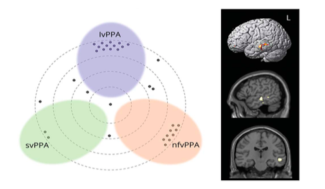A study published in the journal Neurology, conducted by Dario Saracino, Isabelle Le Ber (AP-HP), and their collaborators, highlights the importance of testing for mutations in a specific gene, the progranulin gene (GRN), in order to distinguish primary progressive aphasias associated with Alzheimer's disease from those resulting from frontotemporal degeneration.
Frontotemporal degenerations (FTDs) are particularly heterogeneous pathologies with a difficult diagnosis. They take different forms that sometimes seem very distant but can stem from the same genetic causes, such as mutations in the progranulin gene (GRN). These mutations usually manifest as a behavioral variant of FTD, characterized by behavioral and social conduct disorders.
"Identifying genetic mutations associated with FTDs is crucial. Currently, there are no effective treatments for these diseases. Studying the major genetic forms of these diseases opens the way to a better understanding of the underlying pathological processes and the possibility of intervening with innovative therapies when they become available," explains Dario Saracino, neurologist and first author of the study.
More rarely, FTDs can present as primary progressive aphasias (PPAs), with progressive impairment of language. PPAs are distinguished into three variants:
- Nonfluent, with difficulties in producing or understanding complex syntactic sentences, as well as articulation disorders;
- Semantic, with a loss of word meaning;
- Logopenic, where the main feature is word-finding difficulty.
The nonfluent and semantic variants are clearly associated with frontotemporal degenerations, as confirmed by neuropathological analyses in patients' brains.
In contrast, the logopenic form is associated with Alzheimer's disease lesions in 75 to 85% of cases, with the presence of amyloid plaques and neurofibrillary degeneration, as shown by neuropathological studies or based on biomarker analysis in the CSF or amyloid PET imaging (PiB). However, it has recently been shown that 15 to 20% of patients with logopenic primary progressive aphasia do not have typical Alzheimer's disease lesions (so-called "amyloid-negative" forms). The cause(s) of these amyloid-negative forms remain unknown.
The study conducted by Dario Saracino, Isabelle Le Ber (AP-HP), and their collaborators is the result of a prospective multicenter work that began over 20 years ago, bringing together the main FTD expert centers in France, collaborating within the framework of the National Research Network on FTDs. Nearly 2,000 patients have been documented, and a large amount of clinical, genetic, and imaging data has been collected by this network. This large cohort has enabled the study of a significant series of patients with PPA and carrying a GRN gene mutation, to draw broader conclusions about this rare form of FTD.
"Today, research on these forms of FTD has only produced single case reports or small cohort studies, which did not provide clinically usable information, meaning the characteristics that, when facing a patient with primary progressive aphasia, would lead to testing genes such as the GRN gene"
The researchers demonstrated that the most frequent form among these patients with PPA linked to a GRN gene mutation was the logopenic variant. "The imaging profiles of patients with logopenic PPA associated with Alzheimer's disease or a GRN mutation are comparable. This underscores the importance of characterizing the linguistic profile of these patients to target this genetic form, once Alzheimer's disease is ruled out," explains the clinician-researcher. The study also helped clarify the key characteristics of other PPA variants associated with GRN mutations, particularly the nonfluent and mixed forms.
These findings broaden the clinical spectrum associated with GRN mutations. They allow for a diagnostic analysis to be proposed to patients with non-amyloid logopenic PPA, and for genetic counseling to be offered to these patients' families, as well as directing them towards observational and therapeutic protocols. Given the imminent and upcoming treatments, it is more important than ever to distinguish PPAs due to a GRN gene mutation from those related to Alzheimer's disease.
Sources
https://pubmed.ncbi.nlm.nih.gov/33980708/
Saracino D, Ferrieux S, Noguès-Lassiaille M, Houot M, Funkiewiez A, Sellami L, Deramecourt V, Pasquier F, Couratier P, Pariente J, Géraudie A, Epelbaum S, Wallon D, Hannequin D, Martinaud O, Clot F, Camuzat A, Bottani S, Rinaldi D, Auriacombe S, Sarazin M, Didic M, Boutoleau-Bretonnière C, Thauvin-Robinet C, Lagarde J, Roué-Jagot C, Sellal F, Gabelle A, Etcharry-Bouyx F, Morin A, Coppola C, Levy R, Dubois B, Brice A, Colliot O, Gorno-Tempini ML, Teichmann M, Migliaccio R, Le Ber I; French Research Network on FTD/FTD-ALS.Neurology. 2021 Jul 6;97(1):e88-e102.







